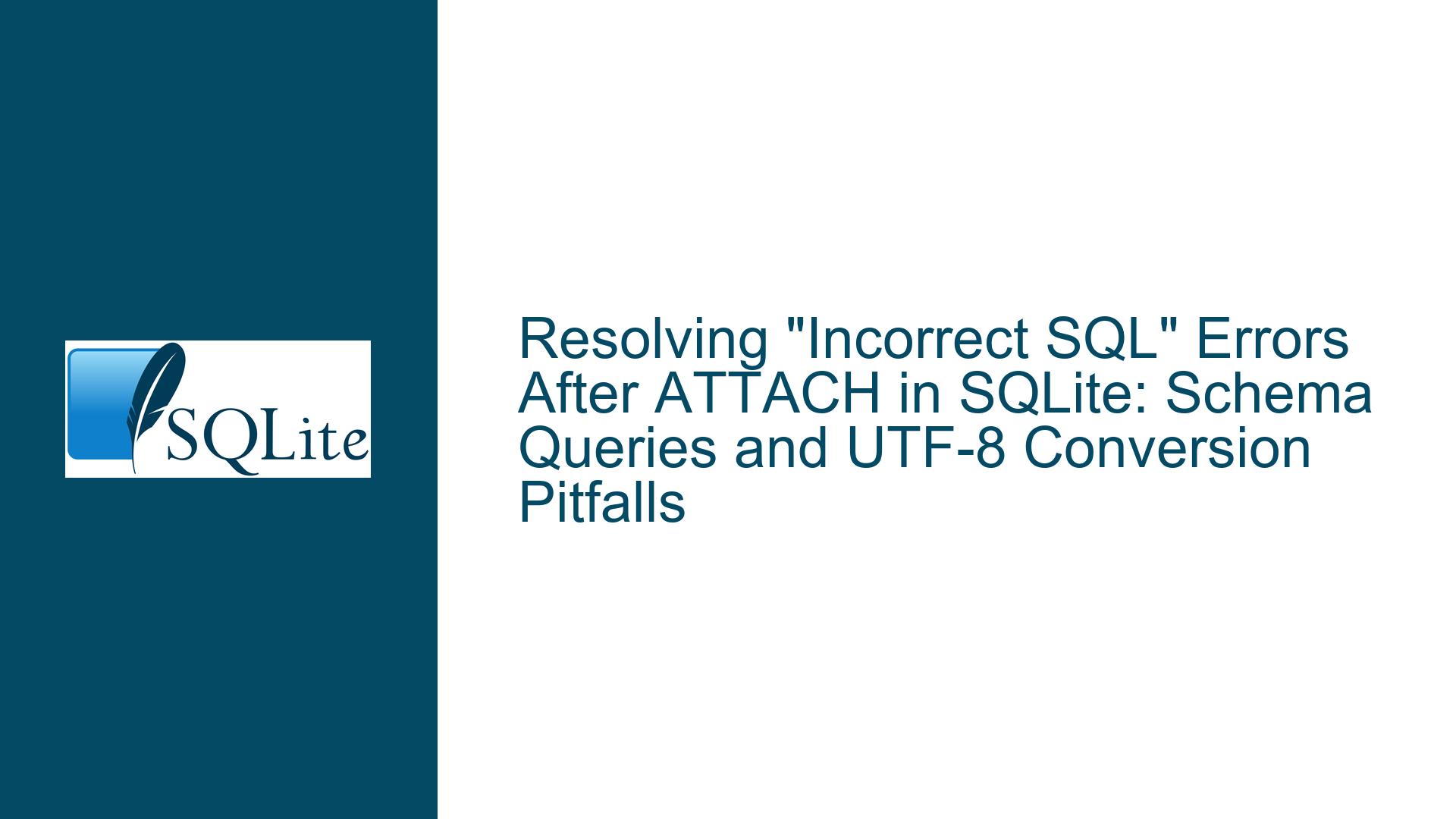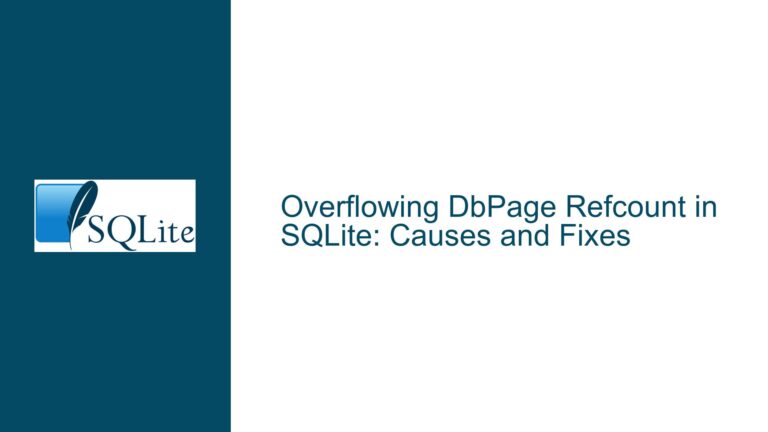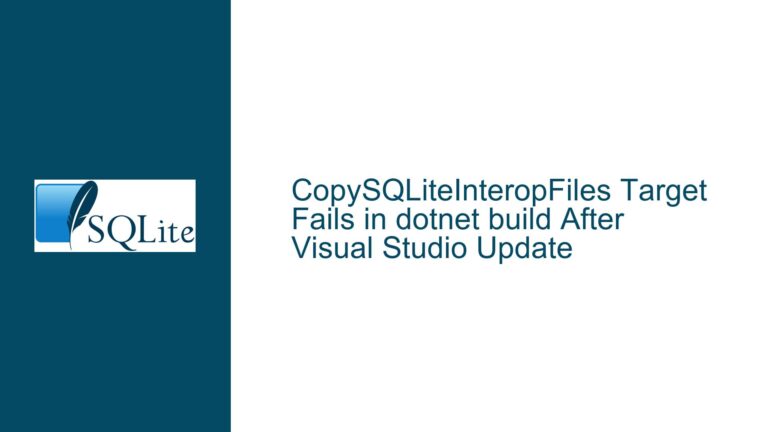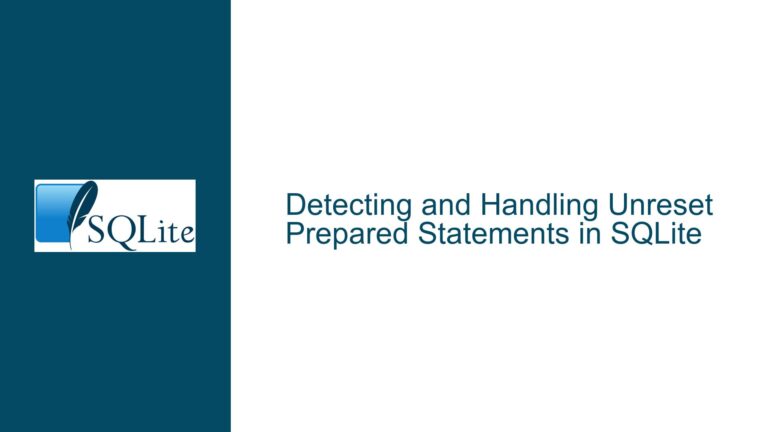Resolving “Incorrect SQL” Errors After ATTACH in SQLite: Schema Queries and UTF-8 Conversion Pitfalls
Issue Overview: Failed Query on Attached Database Due to Encoding or Syntax Misinterpretation
The core problem revolves around executing a SELECT statement on an attached SQLite database after a successful ATTACH operation. The user constructs a query targeting the sqlite_master table of the attached database (e.g., draft.sqlite_master) to retrieve table/view names. While the ATTACH command succeeds, the subsequent query fails during preparation with a generic "Incorrect SQL" error. The root cause lies in a combination of factors related to string encoding mismatches, incorrect SQL statement byte-length calculations, and improper error handling that obscures the true nature of the failure.
Key observations from the discussion:
- The
ATTACHoperation usessqlite3_exec, which executes the statement to completion (returningSQLITE_OKon success). - The failing
SELECTquery is constructed using astd::wstring(wide string) and converted to UTF-8 viastd::wstring_convert<std::codecvt_utf8<wchar_t>>. - The
sqlite3_prepare_v2call passes the length of the original wide string (query1.length()) instead of the byte length of the converted UTF-8 string. - Error messages initially appear misleading (e.g., "another row available") due to improper retrieval of error codes after API calls.
Possible Causes: Encoding Mismatches, Byte-Length Errors, and Error Handling Oversights
1. UTF-8 String Conversion and Byte-Length Miscalculations
- Problem: When converting a
std::wstring(typically UTF-16 or UCS-4 on Windows) to UTF-8, the resulting byte sequence’s length differs from the original wide string’s character count. Passing the originalwstring::length()value (number of wide characters) tosqlite3_prepare_v2as the SQL string’s byte length causes SQLite to parse an incomplete or overextended buffer. This leads to syntax errors or truncated SQL statements. - Example: A wide string
L"SELECT..."with 10 characters might convert to a UTF-8 string of 15 bytes. Using10as the byte length truncates the SQL string, making it syntactically invalid.
2. Schema or Table Name Quoting Issues
- Problem: If the attached database’s alias (
draftin this case) or its tables contain special characters (e.g., spaces, keywords), they must be properly quoted. While the example usesdraft.sqlite_master, which is valid, dynamically constructed schema names from user input (e.g., filenames with spaces) may require escaping or quoting. - Edge Case: The attached database’s file path contains spaces but is properly quoted in the
ATTACHstatement. However, the schema alias (assigned viaAS draft) might inadvertently include invalid characters if derived from the filename.
3. Error Code Misinterpretation and API Misuse
- Problem: Reliance on
sqlite3_errcode()without checkingsqlite3_errmsg()orsqlite3_extended_errcode()obscures the actual error. The initial "Incorrect SQL" message is a custom translation ofSQLITE_ERROR(result code 1). Later, retrieving "another row available" (SQLITE_ROW, code 100) suggests confusion betweensqlite3_stepandsqlite3_prepare_v2error states. - API Misstep:
sqlite3_prepare_v2cannot returnSQLITE_ROW; this code is exclusive tosqlite3_step. Checking the wrong function’s return value leads to incorrect assumptions.
Troubleshooting Steps, Solutions & Fixes
Step 1: Validate the UTF-8 Conversion and Byte Length
Action: Ensure the converted UTF-8 SQL string is correct and its byte length is accurately calculated.
Log the Converted SQL String:
Before passing the SQL tosqlite3_prepare_v2, log or debug-print the UTF-8 string to verify its integrity:std::string utf8_query = sqlite_pimpl->m_myconv.to_bytes(query1.c_str()); printf("Generated SQL: %s\n", utf8_query.c_str());This reveals hidden issues like unintended whitespace, missing semicolons, or malformed schema references.
Use the Correct Byte Length:
Replace(int)query1.length()with the actual byte length of the UTF-8 string:int byte_length = static_cast<int>(utf8_query.size()); sqlite3_prepare_v2(..., utf8_query.c_str(), byte_length, ...);The
lengthparameter insqlite3_prepare_v2expects the number of bytes in the UTF-8 string, not the number of wide characters.
Solution Code:
std::wstring query1 = L"SELECT name FROM draft.sqlite_master WHERE type='table' OR type='view';";
std::string utf8_query = sqlite_pimpl->m_myconv.to_bytes(query1.c_str());
int byte_length = static_cast<int>(utf8_query.size());
sqlite3_prepare_v2(m_db, utf8_query.c_str(), byte_length, &stmt, nullptr);
Step 2: Verify Schema Validity and Quoting
Action: Ensure the schema alias (draft) and attached database path are correctly quoted and valid.
Sanitize User Input:
If the schema name is derived from user input (e.g., a filename), sanitize it to prevent SQL injection or invalid identifiers. Usesqlite3_mprintfwith%w(for schema/table names) or%Q(for string literals):// For schema aliases: char* schema_safe = sqlite3_mprintf("%w", user_input_schema.c_str()); std::string attach_query = "ATTACH ? AS " + std::string(schema_safe); sqlite3_free(schema_safe);Use
sqlite3_errmsgfor Detailed Errors:
Replace custom error messages with SQLite’s native error reporting:if (res != SQLITE_OK) { std::cerr << "SQL Error: " << sqlite3_errmsg(m_db) << std::endl; }This reveals issues like
no such table: draft.sqlite_masteror syntax errors.
Step 3: Correct Error Handling and API Flow
Action: Follow SQLite API best practices to avoid misinterpreting error states.
Check Return Codes Immediately:
After each API call, check its return code and handle errors before proceeding:sqlite3_stmt* stmt = nullptr; const char* tail = nullptr; int res = sqlite3_prepare_v2(m_db, utf8_query.c_str(), byte_length, &stmt, &tail); if (res != SQLITE_OK) { // Handle error using sqlite3_errmsg() return; }Finalize Statements and Reset Connections:
Always finalize prepared statements and reset the database connection after errors:if (stmt != nullptr) { sqlite3_finalize(stmt); stmt = nullptr; }Enable Extended Error Codes:
Compile SQLite with-DSQLITE_ENABLE_COLUMN_METADATAand usesqlite3_extended_errcode()for granular error details:int extended_code = sqlite3_extended_errcode(m_db); printf("Extended error code: %d\n", extended_code);
Final Solution Code:
std::wstring schema = L"draft";
std::wstring query1 = L"SELECT name FROM " + schema + L".sqlite_master WHERE type='table' OR type='view';";
// Convert to UTF-8 and calculate byte length
std::string utf8_query = sqlite_pimpl->m_myconv.to_bytes(query1.c_str());
int byte_length = static_cast<int>(utf8_query.size());
// Prepare the statement
sqlite3_stmt* stmt = nullptr;
const char* tail = nullptr;
int res = sqlite3_prepare_v2(m_db, utf8_query.c_str(), byte_length, &stmt, &tail);
if (res != SQLITE_OK) {
std::cerr << "Prepare failed: " << sqlite3_errmsg(m_db) << std::endl;
sqlite3_finalize(stmt);
return;
}
// Step through results
while ((res = sqlite3_step(stmt)) == SQLITE_ROW) {
// Process rows...
}
if (res != SQLITE_DONE) {
std::cerr << "Execution failed: " << sqlite3_errmsg(m_db) << std::endl;
}
sqlite3_finalize(stmt);
By addressing encoding mismatches, byte-length errors, and error handling flaws, the query against the attached database’s sqlite_master table will execute successfully.






